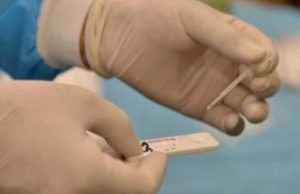
New Delhi, Nov 29 Omicron, the newly-detected Covid variant which has stoked fears of vaccine resistance, is the most mutated version of the virus found so far.
Health experts in India on Monday claimed that the currently available diagnostics measures may not make accurate detection of the Omicron Covid variant.
In the last two years of the Covid-19 pandemic, the SARS-CoV-2 virus has mutated, resulting in genetic variation in the population of circulating viral strains. Molecular, antigen and serology tests all get affected by viral mutations due to the inherent design differences of each test.
The World Health Organization had last week classified the latest variant B.1.1.529 of SARS-CoV-2 virus as Omicron, a ‘Variant of Concern’ (VOC), which means it could be more contagious, more virulent or more skilled at evading public health measures, vaccines and therapeutics.
According to the global health body, the Omicron variant falls under the S gene. The S gene encodes the spike glycoprotein of SARS-CoV-2, the virus causing Covid-19, and is also targeted to specifically detect the presence of SARS-CoV-2.
“Most of the current ICMR approved RT-PCR kits being used in India target the E, Rd Rp and N genes. The mutations in the latest variant have occurred in the S gene. The common RT-PCR kits being used will be able to identify positive or negative, but will not be able to identify if the positive result is due to the mutation in the S gene,” Arjun Dang, CEO, Dr Dangs Lab, told .
“As per the data, RT-PCR kits for S gene, especially the Taqpath kit from Thermofisher, will be able to screen the new variant,” said Veena Menon, Consultant, Clinical Virology, Amrita Hospital.
Researchers have spotted B.1.1.529 in genome-sequencing data from Botswana. The variant stood out because it contains more than 30 changes to the spike protein the SARS-CoV-2 protein that recognises host cells and is the main target of the body’s immune responses.
Among the large number of mutations, some are concerning. Preliminary evidence suggests an increased risk of reinfection with this variant, as compared to other VOCs, the WHO said.
Meanwhile, the global health body stated that current SARS-CoV-2 PCR diagnostics continue to detect the new variant.
“Several labs have indicated that for one widely used PCR test, one of the three target genes is not detected (called S gene dropout or S gene target failure), and this test can therefore be used as a marker for this variant, pending sequencing confirmation,” the WHO statement said.
Gene dropout is a situation wherein if a mutation occurs in the part of the virus’ genome assessed by a PCR test, the sample may result in gene “dropout”.
“Using this approach, this variant has been detected at faster rates than previous surges in the infection, suggesting that this variant may have a growth advantage,” it added.
“But mutations in the S gene are more common, which affects not only virus infectivity, but also detection. It was also seen in the case of Alpha and Beta variants. The new variant has a mutation/deletion similar to the Alpha variant and hence S gene drop out test, which is a PCR method, can be used as an initial screening test,” Menon said.
The Thermo Fisher Scientific on Monday announced that its Covid-19 diagnostic test TaqPath Covid-19 assays, also approved by the US FDA can accurately detect Omicron.
In a statement, the company said: “TaqPath Covid-19 assays can report accurate results even in the case where one of the gene targets is impacted by a mutation.”
Besides, “it can also be used as a proxy for the [Omicron] variant”, according to Mark Stevenson, Chief Operating Officer at Thermo Fisher Scientific.
First detected in Botswana and South Africa, Omicron has since spread to various countries in Europe, including Belgium, the Netherlands, France and the UK, in Australia and Canada, among others.




 Driving Naari Programme launched in Chandigarh
Driving Naari Programme launched in Chandigarh






























